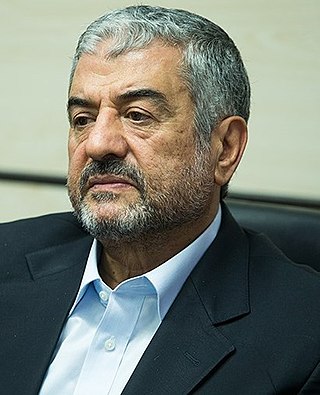Top Qs
Timeline
Chat
Perspective
Mohammad Ali Jafari
Iranian general (b. 1957) From Wikipedia, the free encyclopedia
Remove ads
Major General Mohammad Ali Jafari (Persian: محمدعلی جعفری, born 1 September 1957, also known as Aziz Jafari[2] and Ali Jafari[3]) is a retired Iranian military officer who was the commander-in-chief of the Iranian Revolutionary Guard Corps (IRGC) from 2007 to 2019. He was appointed by Supreme Leader Ali Khamenei on 1 September 2007, succeeding Major General Yahya Rahim Safavi.[4]
According to a 2 September 2007 report by Radio Free Europe, Radio Farda, Jafari was close to the conservative subfaction, which included Mohsen Rezaee, the secretary of the Expediency Discernment Council and former commander of the IRGC and Mohammad Bagher Ghalibaf, a former IRGC member and the mayor of Tehran. The replacement of Safavi was thought to be a move to strengthen the conservative faction as a counterweight to the radicalizers around President Mahmoud Ahmadinejad, to whom Safavi was close.[3]
Jafari was seen as a tactician, organizer, and 'technical' military man, according to Radio Free Europe.[3] The EU's official journal said the three Iranian Revolutionary Guard members, Jafari, General Qasem Soleimani, and the Guard's deputy commander for intelligence, Hossein Taeb, were subject to sanctions for providing equipment and support to Syrian protesters.[5]
Remove ads
Biography
Summarize
Perspective
Jafari was born in Yazd and completed his primary and secondary education there. In 1977 he was admitted to Tehran University, where he studied civil (construction) technology. As a student, he participated in anti-Shah protests in Tehran, and was arrested and sent to jail for this. He represented his university department in the Islamic Organization of Tehran University.[2]
At the start of the Iran–Iraq War Jafari fought with the Basij paramilitary force. In 1981, he became a part of the Revolutionary Guards where he rose to serve as a commander of operative battlefields of south and west during the early 1980s. He also participated as an assistant[clarification needed] in the operation of Susangerd, and served as commander of the Ashura Battalion, as well as of the Garrisons of Qods and Najaf.[2]
After the war Jafari returned to university to complete his education, and in 1992 received a degree in civil (construction) technology. In 1992 and 1993, he taught at the War University of the Revolutionary Guards.[6] He was appointed to head "a strategic research center to map out new defensive and military strategies in response to what Iran's leadership has seen as evolving threats in the Middle East", according to Radio Free Europe/Radio Liberty. Jafari is said to have formed many of his ideas on unconventional or asymmetric warfare at the research center.[3]
Prior to his appointment as leader of the guards, he was also the commander of Thar-Allah Headquarters in Tehran.[6] In 1999, according to Radio Farda, Jafari was among 24 IRGC commanders who signed a letter to President Mohammad Khatami, warning him that his liberalizing policies, at a time of civil unrest in Tehran, threatened the country's leadership.[3]
Jafari is a brother-in-law of Mohammad Bagher Zolqadr, a former deputy interior minister.[3]
Remove ads
Asymmetrical warfare knowledge and ties to Iraq
Jafari's work on asymmetric warfare strategies includes the use of Iranian terrain in mobile-defensive operations and relies on lessons and experiences learned in the Iran–Iraq War. He said in Tehran on 3 September 2007 that, given "the enemy's" numerical or technological superiority, the IRGC would use asymmetrical warfare capabilities such as those used by Hezbollah in its 2006 conflict with Israel in Lebanon. Iranian strategy would also reflect the strengths and weaknesses of U.S. forces in Afghanistan and Iraq, he said.[3]
On 2 September 2007, Radio Farda reported Jafari had extensive fighting experience and close relations with the commanders of the former Badr Brigades of the Supreme Council of the Islamic Revolution in Iraq (SCIRI).[3]
Remove ads
Political views
Summarize
Perspective
Hijab enforcement and public morality campaigns
On 8 March 2024, Jafari advocated for the deployment of hijab enforcement agents at all Tehran metro stations. He emphasized coordinated efforts with Tehran's municipal authorities to expand operations aimed at dismiss "improper hijab" behavior. [7]
Censorship and media repression
Jafari oversaw the IRGC Intelligence Organization, which has been implicated in multiple crackdowns on media and free expression. This resulted in the arrest of several journalists, including Ehsan Mazandarani and Isa Saharkhiz.[8] In addition, In February 2017, further arrests targeted Telegram users and journalists such as Hengameh Shahidi and Morad Saghafi.[9] Jafari stated during a 2014 press conference: "As we have seen, in 1999 the Leader came out strongly against this sowing of doubt, and emphasized the need for the continuing existence of the IRGC for the continuation and advancement of the regime."[10]
Crackdowns on civil and political activists
Under Jafari's command, IRGC units were involved in mass detentions of students, activists, and lawyers. Events include the “Spider” operation in 2015 and 2016 targeted social media users and models on Instagram under morality charges.[11][12] In addition, lawyers Qassem Sholeh Saadi and Arash Kaykhosravi were arrested in 2018 during peaceful activism.[13]
Israel
In 2015, Jafari declared that "The Revolutionary Guards will fight to the end of the Zionist regime." He added that Iran would "not rest easy until this epitome of vice is totally deleted from the region's geopolitics".[14]
In November 2012, Jafari announced that Iran had provided Fajr-5 rocket technology to Hamas.[15]
Sanctions
On 29 September 2010, then–U.S. President Barack Obama imposed sanctions on eight Iranians, including Mohammad Ali Jafari, due to accusations of abusing human rights in 2009.[16]
In 2011, the European Union and the UK imposed sanctions on Jafari for providing equipment and support to suppress protests in Syria.[17][18]
See also
References
External links
Wikiwand - on
Seamless Wikipedia browsing. On steroids.
Remove ads

